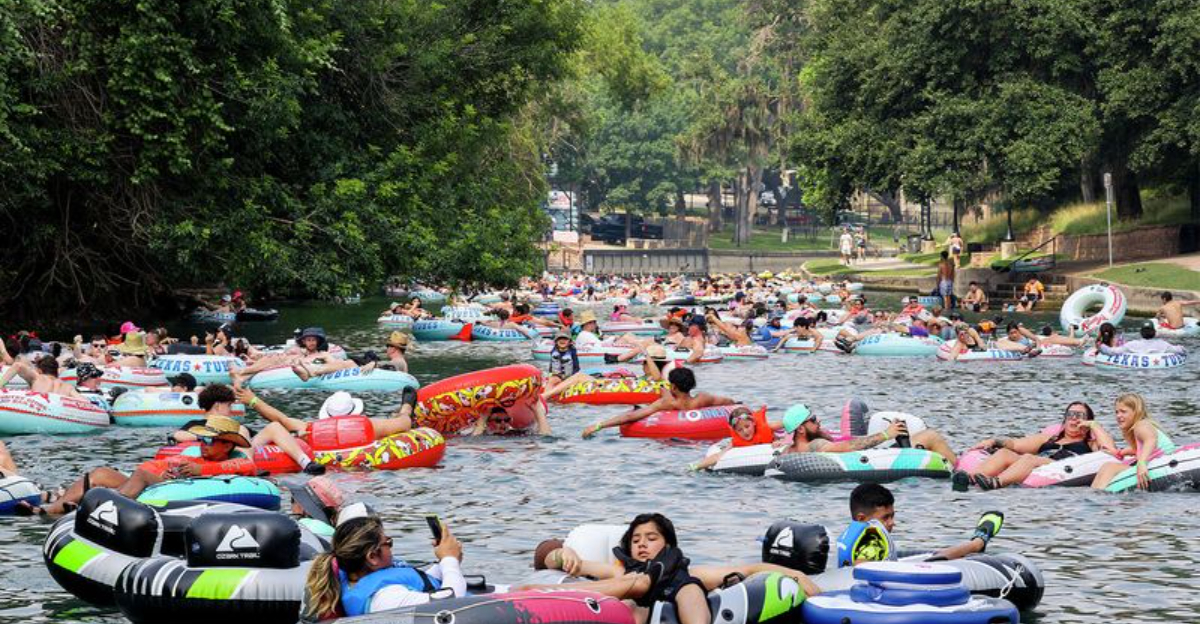
The Texas Hill Country, with its rolling landscapes and charming small towns, has become a victim of its own beauty. Tourists flock to this region for its wineries, swimming holes, and unique culture, bringing both economic benefits and significant challenges. As visitor numbers surge, many locals find themselves priced out of housing markets, stuck in traffic jams, and witnessing their tight-knit communities transform into tourist playgrounds.
Driftwood’s Famous BBQ Creates Rural Gridlock
A single world-famous barbecue restaurant has transformed tiny Driftwood from a quiet crossroads into a traffic nightmare. Cars line up for miles along rural roads, with visitors willing to wait hours for brisket while locals can’t even access their own driveways.
The success of the original establishment has spawned numerous imitators and complementary businesses like wineries and distilleries. What was once farmland is now parking lots and commercial developments catering exclusively to tourists passing through.
Water tables have dropped noticeably as commercial operations drill deeper wells to support their needs. Longtime residents report that the sense of community has eroded as fewer permanent neighbors remain, replaced by weekend visitors who have no stake in local issues like school funding, road maintenance, or preservation of the natural environment that initially made the area special.
Wimberley’s Blue Hole Drowning in Popularity
Wimberley’s Blue Hole Regional Park, once a treasured local swimming spot, now requires reservations weeks in advance during summer months. Residents who’ve enjoyed this natural spring for generations find themselves unable to access it on hot days when they need it most.
The town square, previously home to family-owned shops serving the community, has evolved into a collection of high-end boutiques and art galleries targeting wealthy weekenders. Entire neighborhoods have quietly transformed as houses sell to investors rather than families.
Traffic backs up for miles on summer weekends, turning quick trips to the grocery store into hour-long ordeals. Many longtime Wimberley families have reluctantly relocated to more affordable communities, taking generations of local knowledge and tradition with them.
Dripping Springs: From Rural Escape to Wedding Factory
Nicknamed the “Wedding Capital of Texas,” Dripping Springs has over 35 wedding venues within its small radius. Every weekend brings convoys of rental cars and rideshares ferrying wedding parties through once-peaceful country roads.
The night sky, formerly dark enough for stargazing, now glows with light pollution from venues and new developments. Locals report that the constant weekend noise from multiple simultaneous events has disrupted wildlife patterns and rural tranquility.
Water usage has become particularly contentious, as wedding venues with lush landscaping consume precious resources in a drought-prone region. Many multi-generation ranching families have sold their land to developers after finding it impossible to maintain their traditional way of life amid the wedding boom.
New Braunfels Rivers Overrun with Tubers
Summer weekends in New Braunfels mean one thing: thousands of tubers floating down the Comal and Guadalupe rivers. What locals once enjoyed as a peaceful activity has morphed into a rowdy party scene that overwhelms the natural environment.
Riverside residents contend with trespassing, noise, and litter as tubers exit the water wherever convenient, often through private property. The city spends significant resources on river cleanup, law enforcement, and infrastructure maintenance to manage tourist impacts.
Housing costs near the rivers have increased dramatically, pricing out families who’ve lived there for generations. Even during non-summer months, short-term vacation rentals remain empty while the community faces a housing shortage for teachers, healthcare workers, and other essential employees.
Boerne’s Small-Town Charm Fading Under Development Pressure
Saturday mornings on Boerne’s historic Main Street once meant running into neighbors at local shops. Now, residents avoid downtown entirely on weekends as tour buses and day-trippers from San Antonio crowd the sidewalks.
The charming German architecture that gives the town its character has become a backdrop for chain stores masquerading as local businesses. Longtime family establishments have closed after rent increases made their business models unsustainable.
Housing developments spring up seemingly overnight, transforming hillsides and farmland into subdivisions marketed as “authentic Hill Country living” to out-of-state buyers. School enrollment fluctuates unpredictably as families move in and out, creating challenges for education planning and community cohesion that once defined this close-knit town.
Johnson City Struggles with LBJ Legacy Tourism
The hometown of President Lyndon B. Johnson has become a mandatory stop on Hill Country tours, bringing buses that idle outside the historic sites while passengers explore. Local traffic patterns, designed for a small rural community, buckle under the pressure of constant tourist vehicles.
Beyond the LBJ sites, visitors seeking authentic experiences have transformed the town square. Coffee shops and wine bars have replaced hardware stores and practical businesses that served residents’ daily needs.
The irony isn’t lost on locals that a president who championed rural development would see his hometown become increasingly unaffordable for working families. Young people who grew up in Johnson City often can’t return after college, as housing costs have risen beyond what local wages can support, creating a demographic shift that threatens to erase the very culture tourists come to experience.
Dear Reader: This page may contain affiliate links which may earn a commission if you click through and make a purchase. Our independent journalism is not influenced by any advertiser or commercial initiative unless it is clearly marked as sponsored content. As travel products change, please be sure to reconfirm all details and stay up to date with current events to ensure a safe and successful trip.